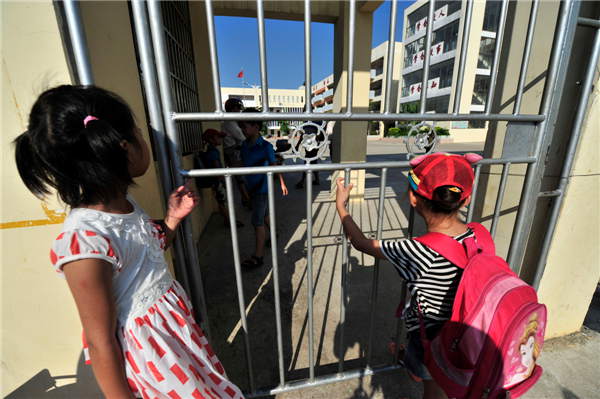
You might not have heard of the once influential folk song movement in Taiwan in the 1970s, but you have probably heard some of the familiar songs from that period like "Olive Tree" (1979) by Chyi Yu, "Childhood" (1981) by Lo Da Yu or "Tomorrow Will Be Better" (1985). The movement that originated in the mid-1970s did not only influence the development of Taiwan's local music, but also that of Hong Kong and the mainland.
But since the numerous composers and singers of that generation ceased to create folk songs for various reasons, audiences haven't heard those lyrical melodies for a long time. To bring back people's memories about that inspirational and aspiring period, one of the three pioneers of that movement, 63-year-old Hu Defu (also known as Ara Kimbo which is his aboriginal name), will perform this Friday in Beijing.
Singing aboriginal blues
"He invented his own Jazz, even better than Blues, because he enables me to see what it is really like when one's soul is liberated," said the renowned Taiwanese chorographer Lin Hwai-min about Hu's music.
Unlike more productive singers, in Hu's 40-year-long singing career, he only released two albums: one is In A Flash from 2005 and another is Sky High Mountain Blues from 2011. However, despite the limited number, he has been persistent in singing folk songs, especially those that display his love for aboriginal culture.
Using images of rustic beauty as metaphors - a range of mountains, gurgling brooks, the silent moon or free-flying birds - most of Hu's songs are about nature. His most well-known song in the mainland was the title track from In A Flash, which left a deep impression on people who heard it as a musical interlude in Feng Xiaogang's 2010 film If You Are the One II.
A combination of blues and his personal feelings for aboriginal culture is commonly heard in Hu's music. "'The Sky High Mountain' (his aboriginal residence in the eastern part of Taiwan and the one he sang about in his 2nd album) is where I came from, and blues gives me the same familiar feeling since I listened to it a lot when I was young," said Hu.
Recalling the exciting era
Although it seems that singing for the aboriginal culture is not a big deal today, in the 1970s it was one of the most pronounced signs and helped to initiate the folk song movement in Taiwan.
Back then, the 1970s was one of the most turbulent periods for Taiwan both socially and regarding people's spiritual development. The political environment that Taiwan was under included the imposition of martial law (promulgated by the Kuomintang authority and lasting from May 1949 to July 1987 throughout Taiwan), which severely restricted local cultural and artistic development. What most people, especially the younger generation, could get for entertainment was exotic Western music.
Meanwhile, with Taiwan suffering diplomatic setbacks one after another on the international stage under the reign of Kuomintang (For example, Taiwan was forced to retreat from the UN in 1971, then there was the official visit of then US president Richard M. Nixon to the mainland in 1972 and the break-off of diplomatic ties between Taiwan and the US in 1979.), the appeal of local cultural awareness was increasingly high.
Together with Yang Hsien and Li Shuangze, the three singers were regarded as pioneers of Taiwan's folk song movement starting from 1975. In that year, Hu and Yang jointly held a small-scale concert at Zhongshan Hall in Taipei, performing songs composed from poems (including the famous poem "Nostalgia in Four Rhymes") by local poet Yu Guangzhong (also a famous scholar and critic in Taiwan), expressing nostalgia for Chinese culture.
In December 1976, in a Western folk music concert in Tamkang University in Taiwan, Li Shuangze, a young painter then, jumped on the stage and questioned loudly, "Why are we all singing Western music? Where are our own songs?" He then shouted wrathfully, "Sing our own song!" arousing a strong sympathetic response from students in the crowd. The incident was so famous within the whole folk song movement that it became known as the "Tamkang Incident."
The pioneering trio led the movement in its early stages singing about the land where they live and composing from the works of Yu and other famous poets including Sanmao, Hu Shi and Xu Zhimo. Their successors followed up closely in a different way, with a more humanistic spirit in their music that emphasized social responsibility.
Hou Dejian and Lo Da Yu were two of the most representative composers with critical spirits then. Hou is best known for his "Decedents of the Dragon (1978)," which is still popular today. In the political climate of that time, the song's fate was volatile. At the beginning it was labeled a signature song on the island for boosting morale, but in 1983 with Hou leaving Taiwan for Beijing, the song was banned by the authorities.
Noting a chapter in history
The once aspiring spirit delivered by the music of that period has drifted away in the decades since, and now our ears are filled with more of those indifferent popular songs themed love or other things.
Among the three pioneers of the folk song movement, only Hu is still active: Li died in an accident in 1977 and Yang resettled in the US. As for their successors, few of them are still composing or singing folk songs.
"The current distorted popular music world has lost respect from intellectuals and the public," said Jonathan Lee, a famous Taiwanese musician, "The popular Taiwan music in those 30 years has lost more than it has attained. I hope this is a period of self-reflection."
"Folk songs experienced a period of revival in Taiwan once before, but clearly it has declined now," said Hu, "but folk songs are an important part of the historic material…, they should not be forgotten."


















![]()
